IMMIGRATION AND
CITIZENSHIP IN THE
TWENTY-FIRST CENTURY
IMMIGRATION AND
CITIZENSHIP IN THE
TWENTY-FIRST CENTURY
Edited by
Noah M. J. Pickus

ROWMAN & LITTLEFIELD PUBLISHERS, INC.
Published in the United States of America
by Rowman & Littlefield Publishers, Inc.
A Member of the Rowman & Littlefield Publishing Group
4501 Forbes Boulevard, Suite 200, Lanham, Maryland 20706
www.rowmanlittlefield.com
PO Box 317
Oxford
OX2 9RU, UK
Copyright 1998 by Rowman & Littlefield Publishers, Inc.
All rights reserved. No part of this publication may be reproduced, stored in a retrieval system, or transmitted in any form or by any means, electronic, mechanical, photocopying, recording, or otherwise, without the prior permission of the publisher.
British Library Cataloguing in Publication Information Available
Library of Congress Cataloging-in-Publication Data
Immigration and citizenship in the twenty-first century / edited by Noah M. J. Pickus.
p. cm.
Includes bibliographical references and index.
ISBN: 978-0-8476-9221-7 ISBN 0-8476-9221-3
(pbk. : alk. paper)
1. ImmigrantsUnited States. 2. NaturalizationUnited States. 3. United StatesEmigration and immigration. 4. United StatesEmigration and immigrationGovernment policy. 5. CitizenshipUnited States. 6. DemocracyUnited States. 7. Political participationUnited States. I. Pickus, Noah M. Jedidiah, 1964.
JV6465.I4727 1998
98-27248
325.73dc21
CIP
Printed in the United States of America
 The paper used in this publication meets the minimum requirements of American National Standard for Information SciencesPermanence of Paper for Printed Library Materials, ANSI Z39.481984.
The paper used in this publication meets the minimum requirements of American National Standard for Information SciencesPermanence of Paper for Printed Library Materials, ANSI Z39.481984.
For Nisan and Anna-Lecee, Max and Rose
For Pick and Sara
And for Micah and Linkon
From the nineteenth century to the twenty-first century
Contents
Rogers M. Smith
Noah M. J. Pickus
Charles R. Kesler
Kwame Anthony Appiah
Juan F. Perea
John J. Miller
David A. Hollinger
Linda S. Bosniak
Noah M. J. Pickus
Joseph H. Carens
Peter H. Schuck
Michael Jones-Correa
Hiroshi Motomura
Daniel J. Tichenor
Acknowledgments
For generous financial support, I am grateful to the H. B. Earhart Foundation, the Jockey Hollow Foundation, the Josiah Charles Trent Memorial Foundation, the North American Studies Program at Duke University, and the vice provost for academic and international affairs at Duke University.
I owe a tremendous debt of gratitude to Betsy Beinecke Shirley and Barbara Smith, who believed in this project well before they had any evidence it would succeed.
My colleagues at the Terry Sanford Institute of Public Policy offered good advice and a congenial place to work. Phil Cook, Joel Fleishman, Bruce Kuniholm, and Fritz Mayer especially made it possible to organize the Duke University Workshop on Immigration and Citizenship and to produce this volume. I owe a special debt of gratitude to Jay Hamilton, who willingly answered all of my questions, great and small. I also received valuable counsel from Alex Aleinikoff, Linda Bosniak, Paul Donnelly, Martin Ford, John Griffin, Jennifer Hochschild, Michael Jones-Correa, Robert Keohane, Elizabeth Kiss, Susan Martin, John Miller, Robert Pickus, David Rosenberg, Peter Schuck, Suzanne Shanahan, Peter Skerry, Peter Spiro, Dan Tichenor, and Scott Wong.
I would like to express special appreciation for the fine work of Troy Dostert, who coordinated the Duke workshop, labored tirelessly and with good humor to corral thirteen authors and fashion this book, and offered excellent intellectual contributions. Special thanks are also due to Maura High for her superb editing skills; Teddie Brown for lending her remarkable talents to making the Duke workshop successful; and Steve Wrinn and Lynn Gemmell at Rowman & Littlefield for their patience and encouragement.
Trudi Abel initiated and nurtured this entire project. Without her, nothing would have been done.
Foreword
Rogers M. Smith
Politicians create citizens. To be sure, as Marx said of history, they do not do so under conditions of their own choosing. But in thinking about the topics of immigration and citizenship, which mean so many things to so many people, it is important first to remind ourselves that for better and worse, it is politicians who establish the rules legally defining who is a citizen and of what sort. Politicians make the laws that make some people officially citizens of one country, other people citizens of different ones, still others not citizens at all but rather subjects or nationals of this or that regime. And sadly, politicians make laws that leave some people bereft of any state or territory willing to recognize them as its own. The laws made by politicians also define much of what citizenship means to peoplethe rights it entails, the duties it imposes, its gradations and conditions, who can get it or lose it, and how they can do so.
In the United States at the close of the twentieth century, all these features of citizenship law are controversial once again. Is the United States letting too many immigrants come, or the wrong kind, and is it good or bad for them to seek to become citizens? What rights should citizens have to government programs like food stamps, unemployment, health care, education, public employment, and officeholding that noncitizens should not have, if any at all? What can we properly demand of those who seek to become or those who are already U.S. citizensmust they know English? Give political allegiance solely to the United States? Display appreciative knowledge of American culture and values more broadly? Under what conditions can the United States get rid of would-be citizens if they dont seem to be working out too well?
These are questions to which American politicians now must give answers, one way or another, like it or not; and again, not under circumstances of their own choosing. But they do have real choices nonetheless, and so do all of us who play some role in shaping the conditions under which politicians choose. The choices American politicians are making today are likely to have tremendous significance for the lives of many millions of people, and for the future of the United States and many other countries, throughout the next century.
To think well about what those choices are and how they should be made, we therefore need to think about politicians and the circumstances under which they choose. We need to think about the politics of citizenship. We need to ponder both the general conditions that lead politicians to create citizens and the particular challenges facing American politicians today. The essays in this book are excellent starting points for doing so.
To see why, let us begin with the big picture. The choice to create citizens really involves several linked but distinguishable issues. One issue is whether most members of a political community should in fact be designated as citizens at all, as members entitled to share in governing, instead of something else such as subjects or nationals. In the United States today the answer to this question seems obvious, but it was not always so. The term citizen is a venerable one, stemming from the ancient Greek city-states and the Roman republic, but those regimes faltered and citizenship, as opposed to subjectship, then almost vanished from the face of the earth. It was revived first in Renaissance Italy, then in very different forms by the political efforts to build large national republics that began in northern Europe during the Enlightenment of the seventeenth and eighteenth centuries. Those efforts had their first great triumph in the creation of the United States. Yet even in the United States, historically many people have been nationals but not citizens, including slaves, Native Americans, and many inhabitants of the colonies acquired in the Spanish-American War. Today the United States still governs some such nationals residing in unincorporated territories like American Samoa, as well as many U.S. citizens with somewhat limited political rights (such as territorial, commonwealth, and D.C. citizens) and many permanent resident aliens with few political rights at all.


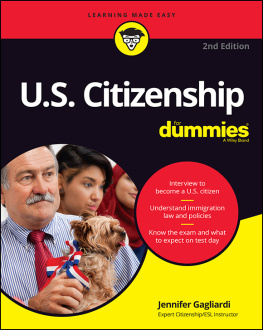
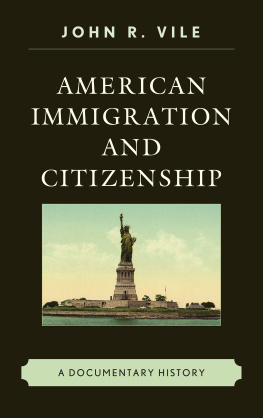

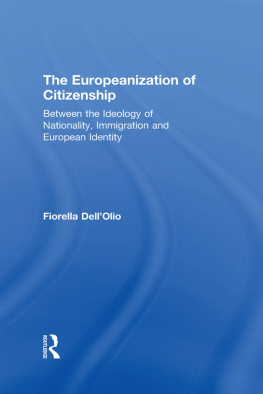
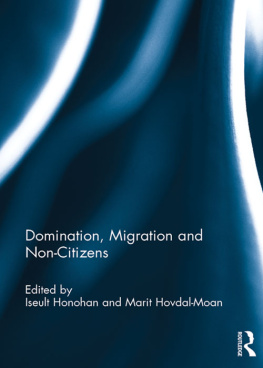
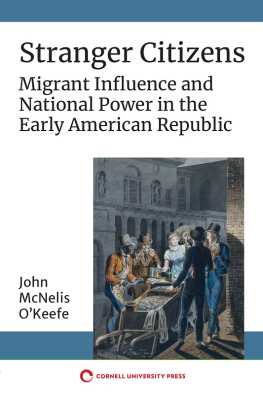
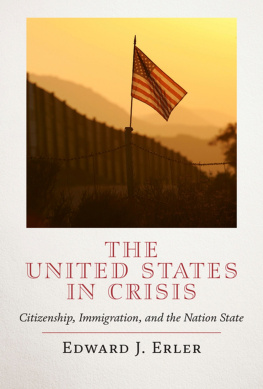
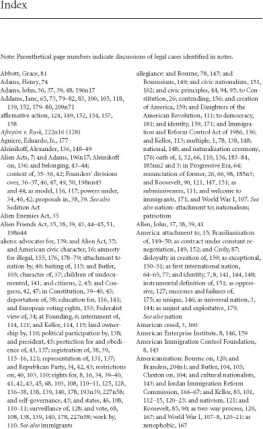
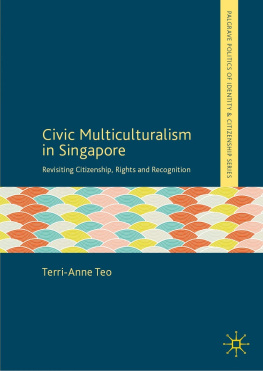
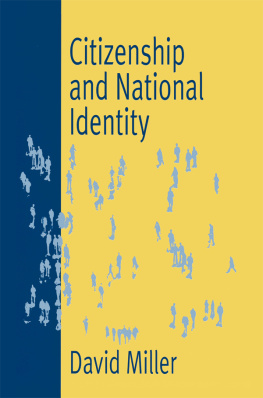

 The paper used in this publication meets the minimum requirements of American National Standard for Information SciencesPermanence of Paper for Printed Library Materials, ANSI Z39.481984.
The paper used in this publication meets the minimum requirements of American National Standard for Information SciencesPermanence of Paper for Printed Library Materials, ANSI Z39.481984.